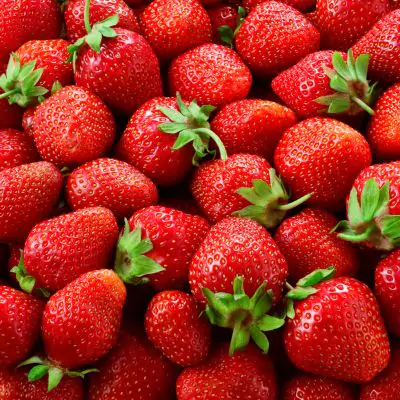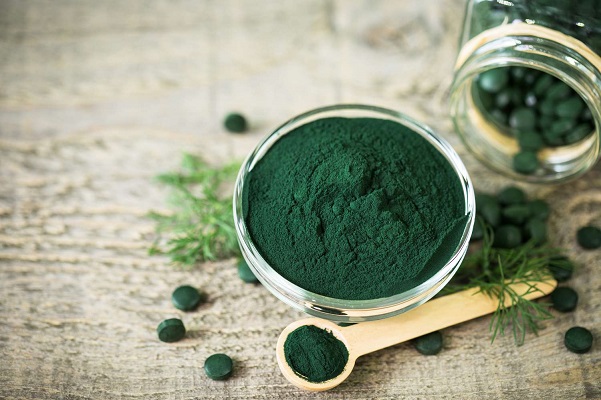On This Page
Overview
Strawberries are a powerful source of several antioxidants, plant compounds, Vitamin C, folate (Vitamin B9), manganese, and potassium. They are also vivid red in color and juicy, tart-sweet, and tart-sweet fruits. Strawberries are simply impossible to resist. There are several reasons why strawberries are everyone’s favorite fruit, and one of the superfoods with the intoxicating aroma, seductive hue, and juicy delicacy. The best part is that they are not only gorgeous to look at and delicious to taste, but they also pack a powerful nutritional and aesthetic punch.
Synonyms of Strawberries
- Fragaria ananassa
- Strawberry
Nutritional Facts of Strawberries
| Energy: | 33 kcal |
| Carbohydrates: | 7.68 g |
| Sugars: | 4.89 g |
| Dietary fiber: | 2 g |
| Fat: | 0.3 g |
| Protein: | 0.67 g |
Phytochemical Constituents of Strawberries
- Flavan-3-ols
- Ellagitannins
- Cinnamic acid conjugates
- Flavanols and ellagic acid conjugates
Therapeutic Uses of Strawberries
- Strengthens Immunity
Vitamin C, an essential component that aids in the defense against a variety of viruses and bacterial illnesses, is abundant in strawberries. Which helps to boost immunity.
- Control Blood Sugar Levels
Along with the antioxidants, strawberries also contain ellagic acid, which slows down the digestion of starchy meals. This prevents the blood sugar from rising after a starchy meal. Additionally, it aids those who have type 2 diabetes in controlling their blood sugar levels.
- Keeps your eyes healthy
Strong antioxidants like those found in strawberries have been proved to prevent cataracts, a condition where the eye’s lens becomes cloudy and, if left untreated, can result in blindness. Vitamin C existence in Strawberries maintains the health of the cornea and retina as well as shields the eyes from free radical damage that could harm the lens.
- Aids Digestion
It is crucial to eat plenty of fiber to maintain a healthy digestive tract. You may get a considerable amount of fiber from strawberries in your regular diet, which will aid in regulating metabolism.
- Anti-cancer agent
With its high concentration of flavonoids, antioxidants, vitamin C, and most notably ellagic acid, strawberries have especially been demonstrated to lower the incidence of esophageal cancer. These offer cancer prevention by slowing the growth of cancer cells and lowering the number of free radicals in the environment.
Home Remedies Strawberries
- Safeguards Skin
Strawberries’ phytochemicals and antioxidants give the skin an incredible glow. These ingredients soothe sunburned skin when applied topically, lessen inflammation, and increase collagen. To reduce damage from dangerous UV radiation and increase elastin fibers in the skin, spread the juice of deeply red strawberries as a face mask and wash it off after 10 minutes.
- Strengthens Nails
Brittle nails can be very concerning, and the biotin found in these amazing fruits is essential to maintaining the strength of your nails. The presence of vitamin C further fortifies the nails by enhancing cell growth and giving them a glossy, strong, and long appearance. Increase your intake of strawberries to have shinier hair as well as healthier nails.
- Whitens Teeth
Malic acid is present in strawberries at trace levels as well, and they quickly whiten teeth naturally. You should brush your teeth with a piece of strawberry and wait 10 minutes before rinsing. Do it frequently to get that pearly, gleaming smile in seconds.

Have A Health Issue?
Consult Online
- Dr. Sahil Gupta (B.A.M.S., M.H.A.)
Ayurvedic Allergy Specialist
CEO & Founder of IAFA®
Ayurvedic Aspects of Strawberries
Ayurveda claims that strawberries’ Vata-balancing and Rechana (laxative) characteristics. They are cooling, sweet, sour, and astringent, with a pungent aftertaste. They can also soothe Kapha dosha and boost Vata dosha. Strawberries are suitable for the Tridosha when consumed in moderation, but excessive consumption can upset all three doshas and may have negative effects on the stomach and lungs, causing nausea and coughing.
Daily Dose: Fresh strawberry dosages have ranged from 250 to 500 g/day
Side Effects of Strawberries
- Allergy
The strawberry has a significant quantity of histamine as well as other ingredients that might make you queasy, nauseous, and itchy. It’s crucial to stay away from strawberries if you have a food allergy. You may experience the issue of food intolerance as a result of histamine. Additionally, it can lead to stomach issues.
- Hemochromatosis
Vitamin C is abundant in strawberries. If you eat too much of it in this situation, you can get stomach pains. In addition, eating a lot of strawberries can result in hemochromatosis.
- Gastronomical problems
Strawberries have a lot of fiber. If you consume strawberries in excess in this condition, diarrhea, abdominal pain, gas, and cramps may result from this.
- Dangerous to the kidney
Because strawberries are high in potassium, they are fantastic for maintaining heart health. However, if you are currently on heart medication, too much potassium can damage your kidneys.
Conclusion
Strawberries have several health advantages. But excessive consumption should be avoided. It can lead to a lot of issues if you consume it excessively. So take advice from professionals before incorporating them into your diet if you have any previous food allergies. If you encounter any side effects or strawberry allergies, you can consult Dr. Gupta at IAFA. He treats allergies and other negative effects through herbal approaches.
References
- https://en.wikipedia.org/wiki/Strawberry
- https://www.ncbi.nlm.nih.gov/pmc/articles/PMC6233386/#:~:text=Major%20polyphenolic%20compounds%20in%20the,et%20al.%2C%202016).










